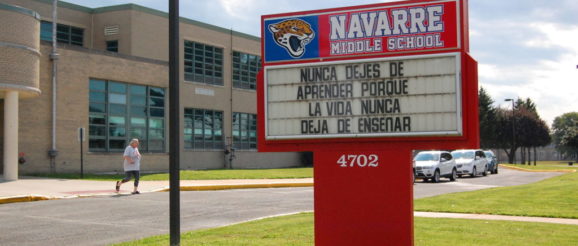South Bend could embrace innovation schools with Purdue charter partnership

In the face of shrinking enrollment and academic problems, the South Bend school district is in talks to form innovation partnerships with at least two charter schools — including Purdue Polytechnic High School, now slated to open its first campus outside the state capital.
If South Bend begins creating innovation schools, it would be the third Indiana district to pursue the strategy, which can bring charter schools under the auspice of the traditional school system. The South Bend schools, which enroll almost 16,000 students, is facing challenges that mirror some of those in Indianapolis Public Schools. Enrollment shrank by nearly 700 students this year, part of a steady decline as families opt for charter, private, and neighboring district schools. In the spring, the district staved off the threat of state takeover at a chronically failing middle school.
Now, the school system may take the radical step of forming innovation partnerships with charter schools, in a bid to boost enrollment and improve education for students in the working-class city, which also houses the University of Notre Dame. (The city has made national headlines in recent months as its leader, Mayor Pete Buttigieg runs for the 2020 Democratic presidential nomination.)
“All of our options are on the table,” said South Bend Superintendent Todd Cummings, who took over in July after serving as deputy superintendent and human resources director for the district. “It brings students back, it gives students options, and it gives us additional partners to work with on making our academics better.”
The only other Indiana districts with innovation schools are Indianapolis Public Schools, home to 21 such schools, and Gary Community School Corporation, which struck an innovation agreement with the manager of Roosevelt High School. In addition to the possibility of partnering with Purdue Polytechnic, the South Bend district is also in talks with Career Academy South Bend, an existing charter network of about 1,300 students seeking to expand its campus.
Innovation schools are independently managed by outside organizations. Their teachers are employed by the operator, and they cannot join the existing union. But the partnership gives the operators access to buildings and district services, such as busing and food service, depending on the terms of the agreement. And the district gets credit for the enrollment and academic performance of the schools from the state.
Currently, the South Bend district has four traditional high schools, with state grades ranging from A to C. Cummings said he thought Purdue Polytechnic could be a good option for students because it would help them win admission to Purdue University.
The possibility of creating innovation schools is the latest sign that the South Bend district could undergo significant changes under Cummings’ leadership. As deputy superintendent, he helped establish a transformation zone overseen by a dedicated board, which includes chronically failing middle school and the elementary schools that feed into it. He has also touted the potential of giving principals more autonomy.
Partnerships between district and charter schools are an increasingly common strategy across the country, transforming cities such as Denver and Newark. Advocates argue they can help improve struggling districts by bringing in expertise from successful charter schools, giving students access to new choices, and allowing principals the autonomy to make decisions for their buildings.
But the innovation model is controversial among critics of charter schools, who argue the schools can drain money and resources from traditional district campuses. So far there has not yet been vocal pushback against the plan in South Bend, Cummings said.
The Purdue Polytechnic charter network was founded by Purdue University with the aim of giving low-income students and children of color the kind of education that will prepare them to study at the university, and leaders plan to expand statewide in the coming years.
The science- and technology-oriented network chose South Bend for its first site outside of Indianapolis in part because the district has been open to working together, said Scott Bess, Purdue Polytechnic’s head of schools.
“They’re actively trying to figure out how do they make the South Bend schools collectively — without reference to kind of governance — how do they make them better?” Bess said.
Purdue Polytechnic is applying for a charter for the South Bend school from the Indiana Charter School Board this year. The new school would open before the first Purdue Polytechnic campus, which launched in 2017 as part of the Indianapolis Public Schools innovation network, graduates its first class. Last school year, its class of students outpaced the state average passing rate on 10th-grade exams, but there’s limited information on the success of the model, which is built around multi-week projects.
Bess says, however, that many Indiana students of color and children from low-income families are being left behind by high schools when it comes to their graduation rates, college enrollment, and long-term economic prospects.
“I’m not willing to sit by and say to a student who’s in seventh or eighth grade now, ‘Hey, sorry, we’ve got to wait another five or six years before we have rock-solid data,’ ” Bess said. “Why not take a shot if you know that what’s there is not working?”
The post South Bend could embrace innovation schools with Purdue charter partnership appeared first on Chalkbeat.
